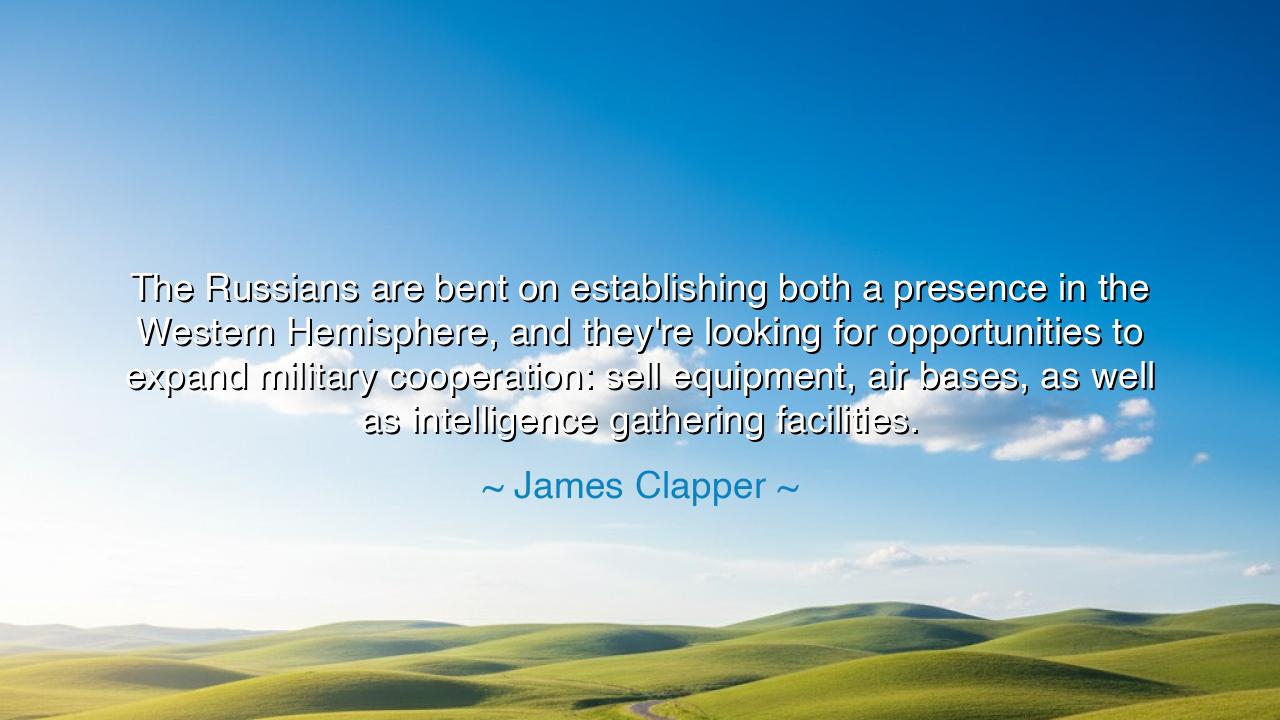
The Russians are bent on establishing both a presence in the
The Russians are bent on establishing both a presence in the Western Hemisphere, and they're looking for opportunities to expand military cooperation: sell equipment, air bases, as well as intelligence gathering facilities.






Here is an ancient-style reflection on James Clapper’s quote:
The Shadow Across the Hemisphere
When James Clapper said, “The Russians are bent on establishing both a presence in the Western Hemisphere, and they’re looking for opportunities to expand military cooperation: sell equipment, air bases, as well as intelligence gathering facilities,” he spoke not merely as a statesman, but as a sentinel — one who has spent his life standing upon the high walls of the republic, watching the movements of distant powers. His words, though rooted in the age of modern strategy, echo the eternal theme of human history: the struggle for influence, the reach of empire, and the ceaseless tension between ambition and vigilance.
The meaning of his words is both practical and philosophical. On one level, Clapper warns of the expansion of power, the strategic spread of influence by nations seeking to shape the world beyond their own borders. Yet, beneath this surface lies a deeper truth: that every civilization must guard its foundations not only against external threats, but against the complacency that blinds it. The danger is not merely that others seek dominance — for that has always been the way of nations — but that the vigilant grow weary, and the watchtower falls silent.
The origin of this warning is bound to the long rivalry between great powers — in this case, between the United States and Russia, heirs to opposing visions of order. From the Cold War’s shadowed decades to the present day, their struggle has been waged not only with weapons, but with intelligence, diplomacy, and influence. Clapper, once the Director of National Intelligence, understood that the contest of nations is not confined to battlefields; it unfolds quietly, through alliances forged and secrets gathered. The heart of his message is this: power, once ceded, is seldom regained — and vigilance must never sleep.
History itself bears witness to this eternal lesson. In the days of Athens and Sparta, when the world was young and the light of Greece shone upon the seas, a similar warning was spoken. Athens, rich and proud, grew complacent, believing her walls and wisdom invincible. Meanwhile, Sparta watched, prepared, and struck with precision. The ensuing Peloponnesian War was not born in a moment, but in years of subtle maneuvering — of alliances, promises, and ambition. By the time Athens awakened, her empire was already fading. So too does Clapper remind his age that power unguarded will one day be power undone.
Yet his words are not meant to stoke fear, but to awaken wisdom. For he does not condemn the ambition of nations, which is as natural as the tide, but calls for discernment — that the pursuit of peace must never become an excuse for blindness. The wise understand that strength and understanding must walk hand in hand. A world without vigilance invites chaos; a world without empathy invites war. True intelligence, as Clapper implies, is not the hoarding of secrets, but the balance of awareness and restraint.
Consider, too, that his warning may speak not only of nations, but of individuals. For within every human heart there lies the same contest — the battle between awareness and neglect, purpose and distraction. Just as nations lose their power when they forget their ideals, so too does a person lose their strength when they stop tending the borders of their own character. The external world mirrors the inner: to defend what is precious, one must remain watchful, courageous, and disciplined.
Therefore, O listener, take this lesson to heart: guard what you have built. Whether it is a nation, a community, or a soul, do not let complacency or arrogance open the gates. Be aware of the forces — within and without — that seek to influence you. Respect power, but wield it with wisdom; pursue knowledge, but anchor it in conscience. For intelligence, untempered by morality, becomes manipulation — and vigilance, when divorced from compassion, becomes tyranny.
And so, let Clapper’s words endure not merely as a warning of geopolitics, but as a teaching for every age: that the world is a living balance between ambition and virtue. Empires rise and fall, alliances shift, and the maps of power are redrawn. But those who remain awake — those who guard their principles as fiercely as their borders — will endure. Eternal vigilance, said the ancients, “is the price of freedom.” And so it shall ever be.






AAdministratorAdministrator
Welcome, honored guests. Please leave a comment, we will respond soon